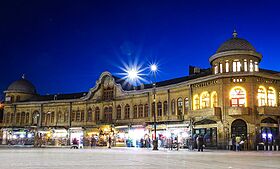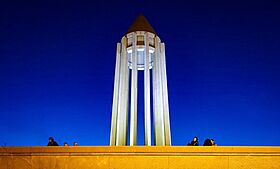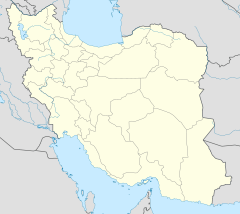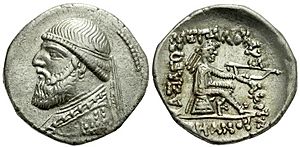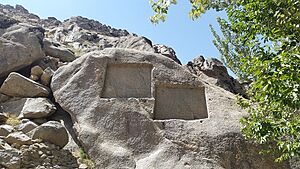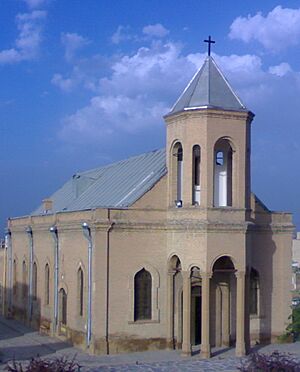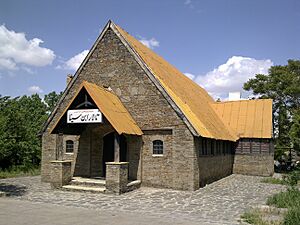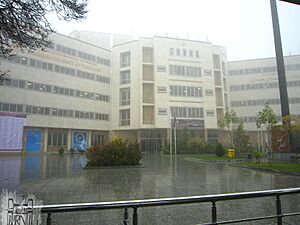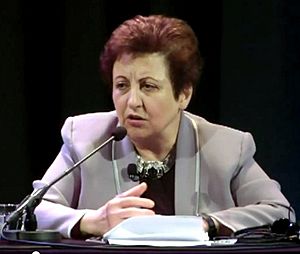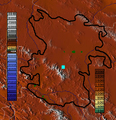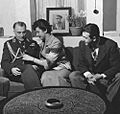Hamadan facts for kids
Quick facts for kids
Hamedan
همدان
|
|
|---|---|
|
City
|
|
|
Central square, Nazari Museum garden, Monument, Abbasabad Spa, Quranic and International Convention Center, Tomb of Avicenna
|
|
| Country | Iran |
| Province | Hamedan |
| County | Hamedan |
| District | Central |
| Elevation | 1,850 m (6,069 ft) |
| Population
(2016)
|
|
| • Total | 554,406 |
| • Rank | 13th in Iran |
| Time zone | UTC+3:30 (IRST) |
Hamedan is a city in western Iran. It is the capital of Hamedan province. In 2016, about 554,406 people lived there.
Many people believe Hamedan is one of the oldest cities in Iran. In ancient times, it was called Ecbatana. It might have been taken over by the Assyrians around 1100 BCE. The Greek historian Herodotus said it was the capital of the Medes around 700 BCE.
Hamedan is in a green, mountainous area. It sits at the foot of the 3,574-meter Alvand Mountain. The city is 1,850 meters (6,069 feet) above sea level. It is about 360 kilometers (224 miles) southwest of Tehran.
Many tourists visit Hamedan in the summer. They come to see its old city and historic places. Some famous sights include the Ganj Nameh inscription, the Avicenna monument, and the Baba Taher monument. Most people in the city speak Persian.
Contents
History of Hamedan
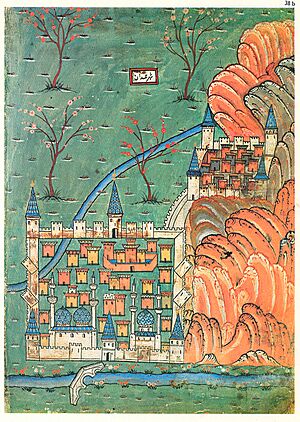
Hamedan is a very old city. It was built by the Medes. Later, it became one of the capital cities for the Achaemenid Dynasty.
Hamedan is even mentioned in the Bible. In the book of Ezra (Ezra 6:2), it says a scroll was found there. This scroll gave the Jewish people permission to rebuild their temple in Jerusalem. Its old name, Ecbatana, is used in the Bible text. Because the city is high up, it was a good place to keep old leather documents safe.
During the Parthian era, Hamedan was the summer home for the Parthian rulers. After them, the Sassanids also built their summer palaces here. In 642 CE, Hamedan was taken over by Muslim Arabs.
The city faced tough times under the Buyid dynasty. But it became great again under the Buyid ruler Fanna Khusraw. The Seljuks took over the city in 1047. They later moved their capital from Baghdad to Hamedan.
In 1220, the Mongols destroyed Hamedan. The city was also completely destroyed during the Timurid invasions. But it grew strong again during the Safavid era.
In the 18th century, the Ottomans took Hamedan. But Nader Shah helped Iran get it back. A peace treaty then returned Hamedan to Iran.
Hamedan was an important stop on the Silk Road. This helped the city have strong trade for many centuries. In the late 1800s, American missionaries started schools in Hamedan.
During World War I, there was heavy fighting in the city. Russian, Turko-German, and British armies all occupied it. Hamedan was returned to Iran in 1918 after the war ended.
People of Hamedan
Languages Spoken
Most people in Hamedan speak a special dialect of Persian called Hamedani Persian. Many also speak standard Persian. A smaller group of people speak Turkic.
| Hamedan linguistic composition | ||||
|---|---|---|---|---|
| Language | Percent | |||
| Hamedani Persian | 50% | |||
| Standard Persian | 25% | |||
| Turkic | 20% | |||
| Mixed | 5% | |||
| Judeo-Hamedani | 0.001% | |||
How Many People Live Here?
In 2006, Hamedan had about 473,149 people. By 2011, the population grew to 525,794. The 2016 census showed 554,406 people living in the city.
Climate and Weather
Hamedan has a climate with hot, dry summers. Its winters are cold and snowy. Temperatures can drop below -30°C (-22°F) on the coldest days. Heavy snow often falls in winter and can stay for up to two months. In summer, the weather is hot and mostly sunny.
- Lowest temperature ever: -34.0°C (-29.2°F) on January 7, 1964
- Highest temperature ever: 40.6°C (105.1°F) on July 14, 1989
| Climate data for Hamedan Airport (1991-2020, extremes 1961-2020) | |||||||||||||
|---|---|---|---|---|---|---|---|---|---|---|---|---|---|
| Month | Jan | Feb | Mar | Apr | May | Jun | Jul | Aug | Sep | Oct | Nov | Dec | Year |
| Record high °C (°F) | 17.0 (62.6) |
20.1 (68.2) |
26.2 (79.2) |
30.1 (86.2) |
34.5 (94.1) |
40.6 (105.1) |
40.6 (105.1) |
40.2 (104.4) |
38.0 (100.4) |
30.0 (86.0) |
24.0 (75.2) |
20.4 (68.7) |
40.6 (105.1) |
| Mean daily maximum °C (°F) | 4.1 (39.4) |
7.0 (44.6) |
12.9 (55.2) |
18.3 (64.9) |
23.8 (74.8) |
30.8 (87.4) |
34.8 (94.6) |
34.5 (94.1) |
29.8 (85.6) |
22.4 (72.3) |
13.0 (55.4) |
7.1 (44.8) |
19.9 (67.8) |
| Daily mean °C (°F) | −2.0 (28.4) |
0.8 (33.4) |
6.2 (43.2) |
11.4 (52.5) |
16.1 (61.0) |
21.8 (71.2) |
25.6 (78.1) |
24.9 (76.8) |
19.7 (67.5) |
13.3 (55.9) |
5.9 (42.6) |
0.8 (33.4) |
12.0 (53.7) |
| Mean daily minimum °C (°F) | −7.3 (18.9) |
−4.8 (23.4) |
−0.3 (31.5) |
4.3 (39.7) |
7.6 (45.7) |
11.2 (52.2) |
14.8 (58.6) |
13.8 (56.8) |
8.9 (48.0) |
4.7 (40.5) |
0.0 (32.0) |
−4.3 (24.3) |
4.1 (39.3) |
| Record low °C (°F) | −34 (−29) |
−33.0 (−27.4) |
−26.6 (−15.9) |
−12.0 (10.4) |
−3.0 (26.6) |
2.0 (35.6) |
6.0 (42.8) |
4.0 (39.2) |
−4.0 (24.8) |
−7.0 (19.4) |
−18 (0) |
−29 (−20) |
−34 (−29) |
| Average precipitation mm (inches) | 30.6 (1.20) |
38.2 (1.50) |
53.0 (2.09) |
50.9 (2.00) |
23.8 (0.94) |
3.6 (0.14) |
3.5 (0.14) |
2.2 (0.09) |
1.5 (0.06) |
23.9 (0.94) |
44.0 (1.73) |
40.0 (1.57) |
315.2 (12.4) |
| Average precipitation days (≥ 1.0 mm) | 6.5 | 6.3 | 7.0 | 7.3 | 4.5 | 0.7 | 0.6 | 0.2 | 0.4 | 3.1 | 6.0 | 6.0 | 48.6 |
| Average snowy days | 6.9 | 6.1 | 3.3 | 0.3 | 0.1 | 0 | 0 | 0 | 0 | 0 | 0.8 | 4.5 | 22 |
| Average relative humidity (%) | 73 | 68 | 57 | 54 | 49 | 37 | 31 | 29 | 31 | 45 | 64 | 72 | 50.8 |
| Average dew point °C (°F) | −7.5 (18.5) |
−5.9 (21.4) |
−4.2 (24.4) |
−0.4 (31.3) |
2.4 (36.3) |
3.1 (37.6) |
4.1 (39.4) |
2.5 (36.5) |
−0.7 (30.7) |
−1.4 (29.5) |
−2.3 (27.9) |
−5.3 (22.5) |
−1.3 (29.7) |
| Mean monthly sunshine hours | 160 | 177 | 217 | 233 | 296 | 355 | 346 | 340 | 314 | 259 | 177 | 153 | 3,027 |
| Source 1: NOAA (snow/sleet days for 1981-2010) | |||||||||||||
| Source 2: IRIMO(extremes) | |||||||||||||
Sports in Hamedan
Hamedan has its own football teams. PAS Hamedan F.C. was started in 2007. Another team is Alvand Hamedan F.C.. Both teams play in the Azadegan League.
The city also has several sports places. These include Qods Stadium, Shahid Mofatteh Stadium, and the National Stadium of Hamadan.
Education in Hamedan
Before the Persian Constitutional Revolution, education in Hamedan was mostly in religious schools. Fakhrie Mozafari School was the first modern school. Foreign groups also started early modern schools like Alliance and Lazarist.
Some popular universities in Hamedan are:
- Bu-Ali Sina University
- Hamedan Medical University
- Hamedan University of Technology
- Islamic Azad University of Hamedan
Famous People from Hamedan
Hamedan has been home to many important people throughout history.
Ancient Famous People
One famous person from before Islam was Mandana. She was the mother of Cyrus the Great. Her father was the last king of Media, Ishtovigo.
Famous People After Islam
Many great people lived in Hamedan after Islam:
- Baba Taher: A famous poet from the 10th century.
- Badi'alzaman Hamedani: He wrote one of the oldest books on a special type of writing called maqam.
- Bu Ali Sina: A very smart scientist and genius. He was born in 980 CE. He came to Hamedan in 1015 CE when it was a capital city. He taught at a big school in Hamedan. He also wrote many of his important books there. His tomb is now in a square named after him in Hamedan.
- Tomb of Esther and Mordechai: This tomb is believed by some to hold the remains of Queen Esther and her cousin Mordechai from the Bible. It is a very important place for Jewish and Christian visitors in Iran.
- Khajeh Rashid al-Din Fazlullah: A minister, scientist, and doctor from the 13th century.
- Mir Sayyid Ali Hamadani: A mystic and scholar from the 14th century.
- Mirzadeh Eshghi: A well-known poet and writer from the time of the Constitutional Revolution.
Modern Famous People
- Abolhassan Banisadr (1933–2021): The first elected president of Iran after the revolution.
- Ahmad NikTalab (1934–2020): A famous modern poet.
- Aminollah Rezaei (1936–2004): A poet known as the "Father of Iranian Surrealism".
- Amir Nosrat'ollah Balakhanlou: He was mayor and a member of parliament for Hamadan City.
- Amir-Shahab Razavian (born 1965): A film director, writer, and producer.
- Ein-Alqozat Hamadani (1098–1131): A great philosopher and Sufi.
- Ehsan Yarshater (1920–2018): A historian and scientist who started Encyclopædia Iranica.
- Fazlollah Zahedi (1892–1963): A military general.
- Hossein Noori Hamedani (born 1925): A Shia religious leader.
- Hanieh Tavassoli (born 1979): An actress.
- Joseph Emin (born 1726): An activist who worked to free Armenia in the 18th century.
- Moshfegh Hamadani (1912–2009): A writer, journalist, and translator.
- Abdulrahman Nafisi (1948-1990): A bank manager.
- Parviz Parastouei: A famous actor.
- Samuel Rahbar: A scientist.
- Shirin Ebadi: A lawyer and winner of the 2003 Nobel Peace Prize.
- Wojtek: A bear born in Hamedan who became a corporal in the Polish army during World War 2.
- Viguen: Known as the "king of Persian pop and jazz music".
- Shahla Sarshar: An Iranian singer.
Important Event
In February 1990, there was a bank robbery in Hamedan. The bank manager, Abdulrahman Nafisi, showed great courage. He tried to protect the bank's money, putting the safety of the funds before his own.
Hamedan's Sister Cities
Hamedan has special friendships with other cities around the world. These are called "twin towns" or "sister cities."
|
Images for kids
-
Tomb of Baba Taher
-
The Tomb of Avicenna
-
The handwriting of Canon of Medicine in the Tomb of Avicenna
-
Hamadan at night. Hamadan was redesigned in 1928 by German architects and urban planners to resemble the spokes of a hexagram.
See also
 In Spanish: Hamadán para niños
In Spanish: Hamadán para niños
 | Jackie Robinson |
 | Jack Johnson |
 | Althea Gibson |
 | Arthur Ashe |
 | Muhammad Ali |


